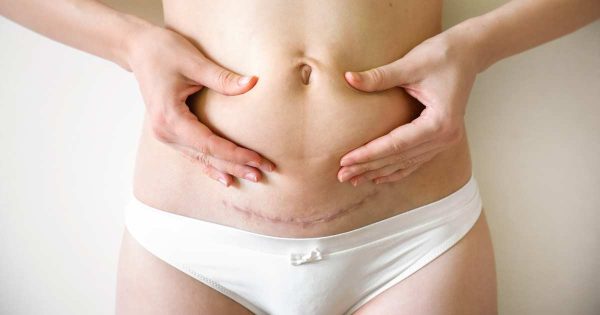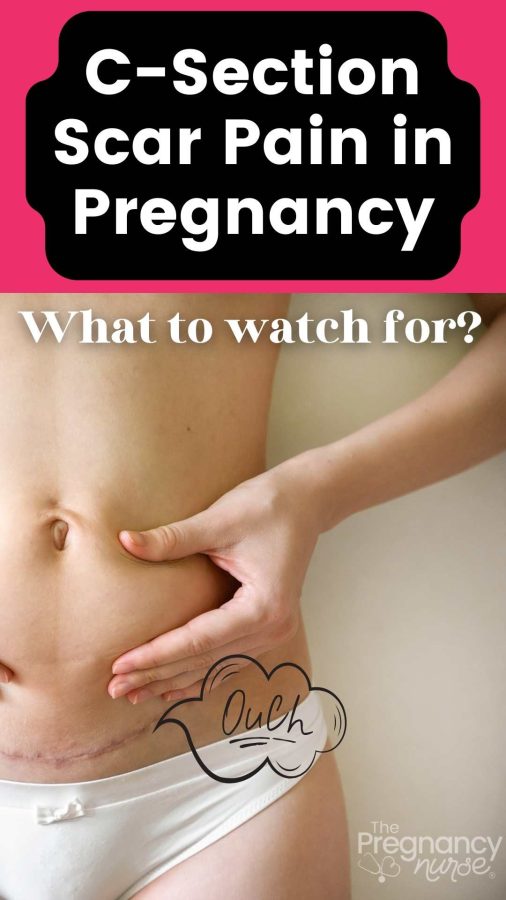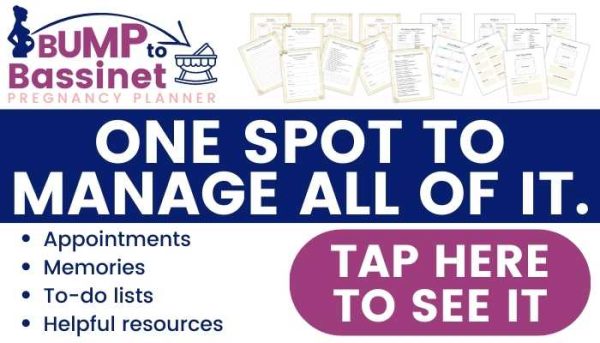📣 YOU are clearly getting prepared for pregnancy, birth & beyond — but do you wish your partner was more involved (looking for a teammate rather than just a cheerleader)? Couples love THIS! 💛🧡💚
Going through a pregnancy can already be filled with enough challenges, so it is only natural to have some concerns when you’re pregnant and developing an ache or pain around your c section scar. Whether it’s the early weeks of pregnancy or further on down the line, feeling discomfort in this area can raise questions and worries about what is happening inside your body. If you are consistently experiencing c section scar pain during any trimester of your pregnancy journey, then read on to learn more about what may be causing it and how you may be able to manage it!

But first, how do I know all of this? Hi — I’m Hilary — The Pregnancy Nurse 👩⚕️. I have been a nurse since 1997 and I have 20 years of OB nursing experience, I am also the curly head behind Pulling Curls and The Online Prenatal Class for Couples. 🩺 I had LOTS of previous cesarean moms as patients who have had this concern. I also know what is important to watch for — so let’s talk about it!
And — while you’re here grab my best tips for c-sections right here:
Of course, any information on this site is purely informational. Please talk with your provider about your specific circumstances including how your last caesarean was performed, and where the placenta for this baby is on your uterine wall. If you have any other symptoms like severe pain, or vaginal bleeding you need to be seen RIGHT away. If the uterus were to rupture at the site of the previous scar you’d most likely have severe pain, as well as bleeding. Not jut an “ache” or “stretching” felt.
TRIGGER WARNING: Remember that your stress affects the baby as well. This article may be more than you want, and the best option may be to just talk with your provider about it at your next appointment if the pain isn’t a lot. But, because you have had previous cesarean deliveries there is more risk to this pregnancy. I will speak to those risks (although small) in this article.
What could be causing the C-section scar pain?
So, it’s important to know a bit about how your body heals when you have a cesrean. First off, everyone’s healing is very different, but many people end-up getting what’s called “scar tissue” in the area around where their incision heals. For most of our injuries that we can heal, it’s just where the wound heals. BUT with surgery that healing sometimes causes what’s called ahesions, where it creates scar tissue in the muscles and things around the uterus in addition to healing the cut into your uterus.
Now, the amount of scar tissues and adhesions that form really varies person to person. We can see this in the OR during subsequent cesareans, where some healed up great, and some have a lot of scar tissue to work around to get the baby out.
I sort of envision it that we used a bunch of glue to fix your uterus (think of a child fixing a broken item). And in doing that, it sort of gets on the other areas of your body. SO, as your uterus starts to grow and stretch of course that glue has adjust and that can cause some incision pain.
Luckily, most of that scar tissue will bend and stretch better than Elmer’s glue. 🙂
You may be thinking that the baby is still SO small in your first trimester, but adding anything into your uterus will make that grow and stretch. And yes, this stretching may continue throughout your pregnancy. Most people find that there’s a few days where the pain is more frequent/intense that they’d prefer, an then it abates for a bit. Then, as baby grows a bit more (or changes position) they may get it back for a bit.
Another reason for C-section scar pain in early pregnancy is related to the hormones your body produces while pregnant. During early pregnancy, progesterone and estrogen levels rise dramatically as your body prepares to nourish and sustain a growing baby. This hormonal surge can cause the abdominal muscles around the c section scar to relax and stretch, and changes in the uterine tissues which can result in pain in the area.
The growth of the placenta can cause some of this pain (and there can be complications if the placenta grows into your incision — called placenta acreta). If the baby implants right at your scar area, it will be more problematic, than if implantation happens elsewhere. See the section below about cesarean scar pregnancies for more info on this.
Additionally, the extra weight and pressure that your uterus puts on the scar can cause additional discomfort. In some cases, if the c section was performed many years ago, it may be possible that the scar itself is causing irritation or infection.
Remember that during a cesarean section there are several incisions are made in the different layers that will need to grow and expand with your growing belly. This includes your skin, the fat layer and then again on the uterus. So, you may have issues with all of those layers expanding.
And, if you’ve had multiple cesarean sections that scar tissue can be compounded.
Remember, it is normal in women who have not had a previous cesarean to also feel growing and stretching involving their abdominal muscles, skin, uterus and ligaments as the baby grows. Yours will just be more never-wracking because of your previous surgery.
Pro Tip: It may help you to figure out where the pain is coming from. Is it just your skin stretching (feels very superficial) or does it feel deeper — which could be more problematic. When we ask patients to describe their pain, it helps us figure out where it is coming from — and you can do this at home too.
What is a Cesarean Scar Pregnancy
{Trigger warning — if you have concerns how learning more about bad things that COULD happen — I’d skip this paragraph — you can head right on down to the next heading}
It is when the fetus implants where the previous caesarean section scar is. It actually doesn’t happen all that frequently, but it can be really problematic. In fact, it’s treated similar to an ectopic pregnancy where the fetus implants outside the uterus (often in the fallopian tube, cervix or in the abdominal cavity) — many people call it a cesarean scar ectopic pregnancy. This article has some good information on what they are and the problems associated with it.
As you can imagine, that cut tissue isn’t a great place for a placenta to grow and nourish your growing baby.
The bad news is that it can be a big issue but can lead to maternal or fetal morbidity. This is why it’s important to talk with your provider about it early in each pregnancy. They can order an ultrasound to be done to see where baby is at in your uterus (and if you’ve already had an ultrasound this would hopefully not be an issue). Early diagnosis of this issue is the key for everyone’s safety, and provide the best treatment options.
Most often these babies can’t continue to grow for various reasons and they recommend termination. You can read more about it here.

Babies & pregnancy after a cesarean can be extra scary. You may not have had a great experience last time either. Come join me in The Online Prenatal Class for Couples where you can get prepared for your next delivery (and hopefully love that one even more).
How to tell if it’s just normal discomfort or something more serious?
I would talk with your provider at your VERY first appointment about what you should be watching out for in relation to your previous surgery. This would be extra important if that surgery was fairly recent (like, you got pregnant soon after your last baby).
If you are feeling discomfort in your c section scar and believe it to be something more than normal pregnancy-related aches and pains, then it is important to reach out to your healthcare provider for further evaluation. It may be helpful for them to perform an ultrasound scan or pelvic exam to make sure the pain isn’t being caused by a complication.
While it is extremely unlikely, there is always the chance of uterine rupture (where your uterus breaks open). The way they sew-up the uterus (especially if your surgery was done in the US) is meant to hold and heal well for subsequent pregnancies, and this is very rare during pregnancy.
Also, if you’re early in pregnancy the risk of this is VERY small (the risk grows are your uterus/belly grows — or, as you go into labor). There are case reports of his happening spontaneously at home, but they are rare.
But, because it IS a risk you want to talk with your provider about what you should watch out for.
What you can do to ease the pain?
Heads up! 👀 There may be affiliate links in here – I might earn a smidge with your click. No cost to you, just good vibes! Check my boring stuff for deets.
Obviously, talk with your doctor or midwife about it. BUT, If your pain is determined to be normal pregnancy-related discomfort (as some scar pain is normal), then there are several steps you can take to alleviate the discomfort.
The first step is to make sure you are getting enough rest and avoiding any strenuous activities that may cause further strain on the area. Think back on your day and think if there was something you did that triggered it. If so, be mindful that activity might want to be avoided for the next few weeks (and I’d mention that to your provider as well).
Additionally, applying a warm compress, or a microwaveable heat pack. over the c section scar can help relax the muscles and reduce pain. Remember I said WARM not hot. A warm bath could maybe help. The crazy thing with this type of pain is that once you feel it, ALL those muscles around it like to tense up, so in addition to the scar stretching you’re also trying to just help that zone relax a bit.
For the most part you don’t want to LAY a heating pad over your belly during pregnancy (that article I linked to about it will help) but using it just over the scar for a short period of time (especially during early pregnancy where baby is so well insulated) should be alright (but check with your provider). Something like this could easy just go along the scar line (rather than your whole belly). I’ve made my own heat packs using just a dish towel and some rice.
Some light massage of the are may help as well to help those tissues chilll-out a bit.
When to go see a doctor about the pain?
As I said, I’d recommend talking to your provider at your next appointment about what you’re feeling (and I recommend making a note in your phone or in your planner so you don’t forget).
If the pain is a lot I’d call them with that information right away. You’d just rather stay on the safe side.
Additionally, if the pain is accompanied by bleeding or other symptoms like fever, lower back pain, or abdominal cramping then you should get evaluated right away as it may be an indication of a serious complication.
In conclusion, c section scar pain in early pregnancy is usually normal and can typically be managed with at-home remedies. However, if the discomfort persists or is accompanied by other symptoms then it is important to reach out to your healthcare provider for further evaluation. I know it’s easy to freak out that something is going wrong, but most often it’s just stretching. 🙂
Ok, I’m so excited for you to have another baby — but you may have a lot of previous trauma coming up from your previous cesarean. Come join me in The Online Prenatal Class for Couples where we talk all about different interventions the hospital may do to help you feel very comfortable with all of that before your next delivery (be it another c-section or a VBAC/TOLAC).
And, if you’re not quite sure you’re ready for that whole thing, check out my free prenatal class. It’s your first step toward getting in the driver’s seat of your birth.





 Alternatives to Tinyhood: Best online childbirth and parenting classes you can take!
Alternatives to Tinyhood: Best online childbirth and parenting classes you can take!
